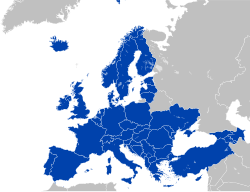Background
The European Political Community (EPC) was founded as an intergovernmental platform aimed at facilitating political and economic coordination among European states, with a principal objective on strengthening cooperation in areas such as security, economic stability, and democratic governance. The platform emerged in response to the increasing geopolitical instability heightened by the Russian invasion of Ukraine, and was proposed by French President Emmanuel Macron in May 2022. It was planned as a flexible, inclusive framework that would enable both EU members and non-EU members, including the United Kingdom, the Western Balkans, to engage in collaborative dialogue, without the requirement of EU membership.
Albania was announced as the host of the sixth summit of the European Political Community by British Prime Minister Keir Starmer during the closing press conference of the fourth summit held in the United Kingdom in July 2024. [3]
In December 2024, it was announced that the summit would take place on 16 May 2025. [4]
This page is based on this
Wikipedia article Text is available under the
CC BY-SA 4.0 license; additional terms may apply.
Images, videos and audio are available under their respective licenses.


